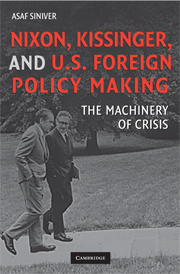Book contents
- Frontmatter
- Contents
- List of Figures
- Acknowledgments
- Abbreviations
- Dramatis Personae
- Nixon, Kissinger, and U.S. Foreign Policy Making
- Introduction
- 1 Structures, Processes, and Personalities in U.S. Foreign Policy
- 2 The Making of U.S. Foreign Policy During the Nixon-Kissinger Years
- 3 The Incursion into Cambodia, Spring 1970
- 4 The Jordanian Crisis, September 1970
- 5 The India-Pakistan War, December 1971
- 6 The Yom Kippur War, October 1973
- Conclusion
- Bibliography
- Index
- Plate section
- References
3 - The Incursion into Cambodia, Spring 1970
Published online by Cambridge University Press: 17 August 2009
- Frontmatter
- Contents
- List of Figures
- Acknowledgments
- Abbreviations
- Dramatis Personae
- Nixon, Kissinger, and U.S. Foreign Policy Making
- Introduction
- 1 Structures, Processes, and Personalities in U.S. Foreign Policy
- 2 The Making of U.S. Foreign Policy During the Nixon-Kissinger Years
- 3 The Incursion into Cambodia, Spring 1970
- 4 The Jordanian Crisis, September 1970
- 5 The India-Pakistan War, December 1971
- 6 The Yom Kippur War, October 1973
- Conclusion
- Bibliography
- Index
- Plate section
- References
Summary
I think we need a bold move in Cambodia … We are going to find out who our friends are now, because if we decide to stand up here some of the rest of them had better come along fast.
Nixon to Kissinger, 22 April 1970Nixon's bold move in Cambodia resulted in the first major international crisis of his administration. Following a military coup in Cambodia that saw the ruler, Prince Sihanouk, ousted, the number of North Vietnamese attacks from Cambodian sanctuaries on U.S. forces in South Vietnam had risen dramatically in the spring of 1970. In response, Nixon ordered more than 30,000 U.S. ground troops into the neutral country to eliminate enemy sanctuaries along the border, disrupt supply lines, and capture the Communist headquarters in Cambodia. Importantly, the incursion followed more than a year of secret bombing of targets in Cambodia which became public knowledge only in May 1970. The ‘widening down’ of the Vietnam War to include attacks on a neutral country led to unprecedented upheaval in the United States, which culminated in the deadly shooting of four students in Kent State University by the National Guard. The controversial invasion of Cambodia also saw the beginning of a congressional process which resulted in the 1973 War Powers Act, which repealed the 1964 Gulf of Tonkin Resolution that had given President Johnson a carte blanche to expand the war in Vietnam.
- Type
- Chapter
- Information
- Nixon, Kissinger, and US Foreign Policy MakingThe Machinery of Crisis, pp. 71 - 114Publisher: Cambridge University PressPrint publication year: 2008



